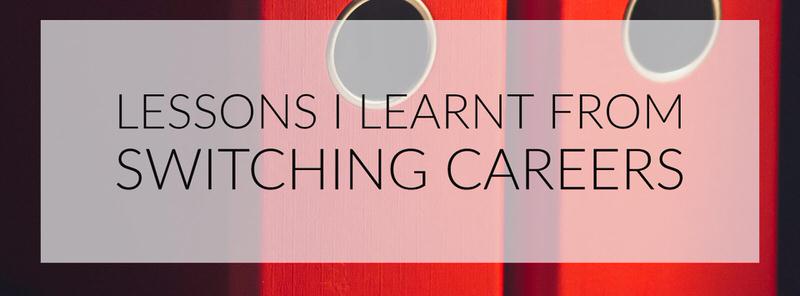The Career Series: Lessons I Learnt From Switching Careers

If you are thinking of changing careers you are not alone. People stay in the same job for only 4.2 years according to the Bureau of Labor Statistics (BLS). While the BLS does not track career change data, a survey by the University of Phoenix reported that 59 percent of US workers want to change their careers because they feel they are not earning enough, do not have enough chance for advancement or are not passionate about their current career.
While there are exceptions to every rule, I think that most people would agree that it is difficult to switch careers. You have all the challenges of starting a new job – meeting new people, getting to know how the organization works, working out your daily commute, creating a relationship with a new boss – as well as the bigger challenges of learning how a whole new industry functions and assimilating a lot of new information and data.
I’ve been through two major career changes – emergency veterinarian to researcher and researcher to science communications – putting me right on track for the three to seven career changes many people like to quote as being the average for our generation.
Here are five lessons I’ve learnt from my experiences:

Talk to people who are doing your potential new career.
Many people want to change careers because their current job is not what they thought it would be. Avoid making the same mistake by talking to as many people as possible who are currently working in the job you think you want. Ask them about their hours, pay, working environment, day-to-day tasks. Ask them what kind of person could excel in that job and what are their biggest challenges. You might find that job isn’t as attractive as you thought.

Get some experience.
If you have no relevant experience, people are much less likely to interview you for a job. Volunteering or interning is one of the best ways to gain that experience and also to start building relationships with industry insiders who might hire you or recommend you to others. It will also help you to work out if you really want to do that job full time, whether you enjoy your daily tasks and can make the best use of your skills.

Get to know recruiters and HR personnel.
These people can help you. It’s their job to find the right person for each role within their organization. If you take the time to build a relationship with them, they will help you as Deepti Wilkinson, former postdoc, now Scientist at Janssen can attest.

Learn the lingo.
Every industry comes with its own language. It will be hard to convince someone to hire you if you don’t speak in the same terms as they do. It can really help to try and learn as much of this as possible before transitioning.
Know that it will be hard starting again.
By the time you decide to transition, you have probably worked your way up the food chain a little and it can be very hard starting at the bottom again having little to no say in how things are done. Couple this with the amount of new information you have to learn, and it can be very overwhelming to start a new career. However, if it means you find something you love to do, it is well worth it.
T his article was originally posted on the Life Science Network and was written by Leah Cannon, a Career Advisory Council member at the Graduate School of Biomedical Sciences and the content editor for Life Science Network.
his article was originally posted on the Life Science Network and was written by Leah Cannon, a Career Advisory Council member at the Graduate School of Biomedical Sciences and the content editor for Life Science Network.

